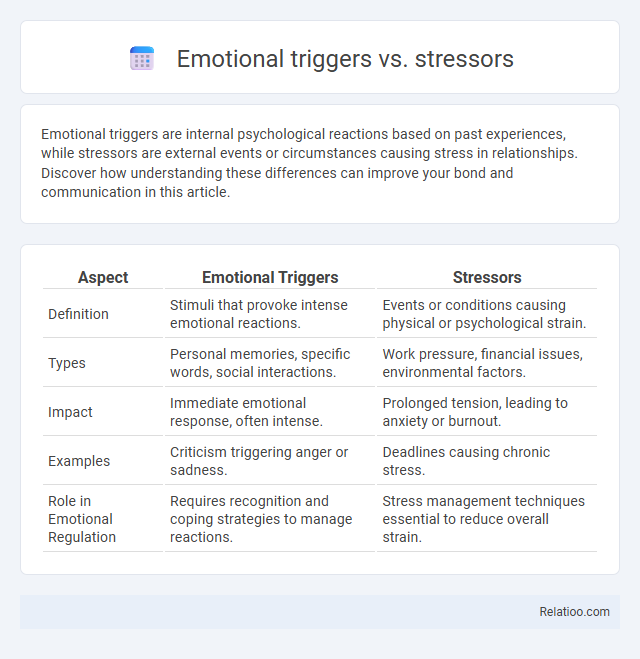Emotional triggers are internal psychological reactions based on past experiences, while stressors are external events or circumstances causing stress in relationships. Discover how understanding these differences can improve your bond and communication in this article.
Table of Comparison
| Aspect | Emotional Triggers | Stressors |
|---|---|---|
| Definition | Stimuli that provoke intense emotional reactions. | Events or conditions causing physical or psychological strain. |
| Types | Personal memories, specific words, social interactions. | Work pressure, financial issues, environmental factors. |
| Impact | Immediate emotional response, often intense. | Prolonged tension, leading to anxiety or burnout. |
| Examples | Criticism triggering anger or sadness. | Deadlines causing chronic stress. |
| Role in Emotional Regulation | Requires recognition and coping strategies to manage reactions. | Stress management techniques essential to reduce overall strain. |
Understanding Emotional Triggers
Emotional triggers are specific stimuli or situations that provoke intense emotional reactions, often rooted in past experiences or unresolved trauma. Unlike general stressors, which cause physical or mental strain, emotional triggers directly activate feelings such as anxiety, anger, or sadness by tapping into deep-seated emotional vulnerabilities. Recognizing and understanding these triggers is essential for effective emotional regulation and improving mental health resilience.
Defining Stressors in Daily Life
Stressors in daily life are external or internal demands that disrupt an individual's psychological or physical equilibrium, leading to a stress response. Common stressors include work pressure, financial difficulties, relationship conflicts, and environmental factors like noise or overcrowding. Understanding stressors enables targeted coping strategies to maintain mental health and resilience.
Key Differences Between Emotional Triggers and Stressors
Emotional triggers are specific stimuli or events that provoke intense emotional reactions based on past experiences, while stressors refer to external pressures or demands that challenge your ability to cope. Triggers often lead to immediate emotional responses such as anxiety or anger, whereas stressors contribute to prolonged mental or physical strain. Understanding these key differences allows you to better manage your reactions and develop healthier coping strategies.
Common Types of Emotional Triggers
Common types of emotional triggers include rejection, abandonment, failure, and criticism, which often evoke strong feelings of insecurity, sadness, or anger. Stressors refer to external events or pressures like work deadlines, financial problems, or relationship conflicts that increase overall stress levels. Triggers encompass both internal and external stimuli that provoke emotional or physiological reactions, highlighting the importance of identifying specific emotional triggers to manage mental health effectively.
Typical Sources of Stressors
Typical sources of stressors include work pressure, financial difficulties, relationship conflicts, and major life changes such as moving or losing a loved one. Emotional triggers are specific events or experiences that evoke intense emotional reactions tied to past trauma or unresolved issues, whereas general triggers may encompass any stimuli provoking a response. Your ability to identify and manage these stressors and triggers is crucial for maintaining emotional well-being and reducing overall stress levels.
How Emotional Triggers Affect Mental Health
Emotional triggers are specific stimuli that evoke intense emotional reactions, often linked to past trauma or unresolved issues, directly impacting mental health by increasing anxiety, depression, and PTSD symptoms. Stressors are external pressures or demands that challenge an individual's ability to cope but may not always evoke a profound emotional response like triggers do. Understanding how emotional triggers uniquely activate neural pathways associated with fear and emotional memory helps in developing targeted therapies for mental health conditions.
The Impact of Stressors on Physical Well-being
Stressors such as chronic work pressure, financial difficulties, or relationship conflicts significantly impact your physical well-being by triggering the body's stress response, leading to increased heart rate, elevated blood pressure, and weakened immune function. Emotional triggers, often linked to specific memories or experiences, activate intense emotional reactions that can exacerbate physical symptoms like headaches or muscle tension. Understanding these distinctions helps in managing the physiological effects of stress and promoting overall health.
Recognizing Your Personal Triggers and Stressors
Recognizing your personal triggers and stressors involves identifying specific emotional triggers that provoke intense feelings, stressors that cause chronic pressure, and general triggers that elicit reactions. Emotional triggers often stem from past experiences and can evoke strong responses like anxiety or anger, while stressors typically relate to external demands such as work deadlines or relationship conflicts. Awareness of these distinctions enables targeted strategies for managing emotional well-being and reducing the impact of stressful situations.
Strategies to Manage Emotional Triggers
Emotional triggers often arise from memories or situations linked to past trauma, distinct from stressors which are external pressures causing general tension, and triggers which can be either emotional or physiological stimuli. Strategies to manage emotional triggers include mindfulness techniques such as deep breathing and meditation, cognitive-behavioral approaches like reframing negative thoughts, and establishing healthy boundaries to reduce exposure to harmful environments. Consistent practice of self-awareness and grounding exercises helps individuals recognize early signs of emotional activation and implement coping mechanisms promptly.
Effective Techniques to Reduce Stressors
Emotional triggers are specific stimuli that evoke intense emotional reactions, while stressors are external pressures or situations that cause stress, and triggers broadly refer to any factors prompting emotional or stress responses. Effective techniques to reduce stressors include mindfulness meditation, cognitive-behavioral therapy (CBT), and time management strategies, which help individuals reframe stress-inducing thoughts and prioritize tasks. Regular physical exercise and deep breathing exercises also regulate the body's stress response, enhancing overall resilience against stressors.

Infographic: Emotional triggers vs stressors
 relatioo.com
relatioo.com